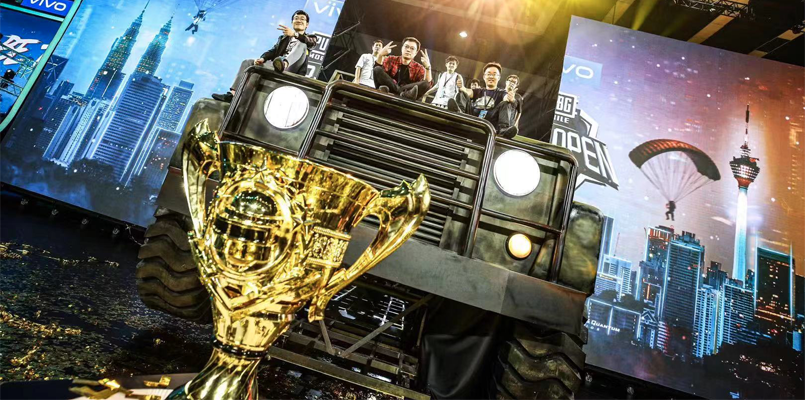Mentioned in this article
Mobile esports is regarded as one of the fast-growing markets, with the highest potential. According to global esports data company Newzoo, there are over 3.2B smartphone users worldwide, and 66% of them are from China, India, and the Asia Pacific region. A recent publication from the firm suggests that the Southeast Asia (SEA) region’s mobile games market is the fastest growing in the world, with a year-on-year growth of 17.4%. For Tencent Games, the publisher of PUBG MOBILE, hosting an esports tournament in Kuala Lumpur could not come at a better time.
The tournament itself, the “PUBG MOBILE Club Open 2019 Fall Split Global Finals,” was held in partnership with Chinese tournament organizer and production company VSPN. The tournament featured a $500K USD total prize pool and saw Indonesia team Bigetron RA win the championship and take home $180K in prize money.
“The PMCO 2019 Fall Split Global Finals had the biggest prize pool in the PUBG MOBILE esports ecosystem in 2019,” Wang Chenfan, vice president of VSPN told The Esports Observer. As the top tier event for the game, the tournament was title sponsored by Chinese phone brand vivo, with a few local Malaysian companies also partnered, including drink brand 100 Plus, Malaysian telecommunications company Yoodo, and food delivery service Hungry.
Compared with vivo, the local partners were comparatively small. Since June of 2018, vivo has become one of the top two business partners for Tencent Esports, alongside global car brand Mercedes Benz.

Taking a closer look at this event, Chinese organizations Tencent, VSPN, and vivo played main roles as the host, producer, and title sponsor, respectively. Speaking on why Chinese companies are interested in the SEA mobile esports market, Chenfan explained: “I can not represent Tencent and vivo, but I believe that our goals are the same – to become a global company, not just a Chinese company.”
“Since VSPN was founded in 2016, the company has been involved in operating multiple esports tournaments outside of mainland China; especially in the SEA and APAC region, including the 2018 Jakarta Asian Games esports demonstration competitions, 2018 PUBG MOBILE Star Challenge (PMSC) in Dubai, and PMSC in Taipei this year,” said Chenfan.
It should be noted that the 2019 PMSC was title sponsored by Google Play, the mobile app store of Google. As well as hosting live esports events on YouTube (including PUBG MOBILE tournaments), Google led a $120M investment in mobile game streaming platform Chushou back in 2018.
“The situation of the SEA mobile esports market is similar with India,” said Chenfan. “SEA has a high population, and most of them are young. Compared with developed countries in Europe and North America, smartphone and telecommunication technology in SEA has rapidly developed. The smartphone users are more active in mobile gaming and esports.”

According to Newzoo’s latest mobile esports research, the SEA region has become the fastest mobile gaming market in the world, with $2.6B revenue and a growth of 17.4%, compared to 2018.
In fact, esports is also gaining significant recognition and supports from the mainstream sports bodies in the SEA region. Six esports games were featured as medal events during the Philippines Southeast Asian Games. The Philippines is just one of several countries to have either officially recognized esports as a sport, as has Thailand, or to have offered it significant government support, such as Malaysia.
Chow Tuck Mun, the CEO of Malaysian telecommunication service Yoodo, the local partner of this event, told The Esports Observer that the company saw large opportunities in the mobile esports market. The telecom even founded a PUBG MOBILE professional team Yoodo Gank, which also qualified in the PMCO Grand Finals.
Although SEA is a new market with high opportunities, international tournament organizers hosting events in the region say it is not easy. Chenfan pointed out that the company had to consider additional sponsorship strategies.

“Compared to China, the SEA market is a combination of multiple countries with different languages and cultures,” said Chenfan. “We need to prepare a number of translators and shoutcasters in multiple languages.”
In China, most of the international esports tournaments feature English, Chinese, and Korean casting talent. In this event, overall 64 players with 17 nationalities participated in the tournament, including China, Thailand, Malaysia, India, Russia, Iraq, South Korea, and Japan.
Different countries also have different cultures. For example, some players were from predominantly Muslim countries. Zhang Wenyi, marketing manager of VSPN told The Esports Observer that the company prepared a prayer room for Muslim players to fulfill their religious traditions during game day.
The PMCO Fall Split Global Finals marked the conclusion of Tencent’s $2.5M PUBG MOBILE esports plan for 2019. Next year, Tencent will put up $5M total prize pool and host three leagues within the PUBG MOBILE global esports ecosystem. With high expectations from SEA mobile esports and experiences in hosting esports tournaments from Chinese companies, it’s most likely the PUBG MOBILE ecosystem will continue to become more professional and stable.

